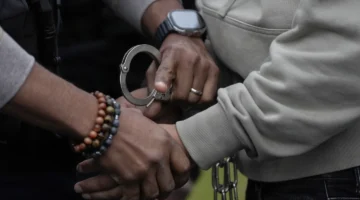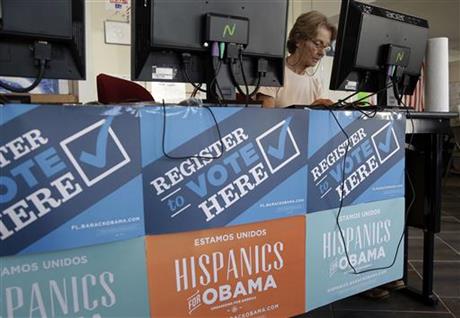Obama campaign machine revving up to elect Clinton
WASHINGTON (AP) — The vaunted data-driven machine that twice got President Barack Obama elected is revving up to help elect Hillary Clinton, as Democrats look to recreate the tactical advantage they used against Republicans in 2008 and 2012.
With Obama’s popularity rebounding, Democrats have been eagerly awaiting the president’s return to campaigning, and he’ll hold his debut event for her Tuesday in North Carolina. Yet campaign officials say just as critical to her success could be an Obama political operation that remains potent four years after his re-election, including deep troves of voter and donor information, and a corps of trained field staffers and volunteers that Clinton’s campaign is now co-opting.
The crown jewel of Obama’s machine, an email list of supporters that included 20 million addresses in 2012, is now fully available to Clinton. That list had been closely held within an Obama campaign committee that still exists to pay off old debt. Democratic groups and even Obama’s Organizing for Action nonprofit had to rent the list for a hefty sum.
Just recently, the DNC started sending emails signed by Clinton to the entire list, including one last week inviting donors to enter a raffle to be Clinton’s guest to the Broadway musical “Hamilton.”
For Clinton supporters, the handover of the email list is the clearest indication that concerns that sprang up after Obama’s re-election have turned out unfounded. In 2013, when Obama declined to transfer the list to the national party, some Democrats griped that he was holding out on his party by sequestering his most coveted campaign resources.
Mitch Stewart, Obama’s battleground states director in 2012, said there was some disagreement that year about whether Obama’s tech-infused strategy would work for other Democrats, or whether the phenomenon was Obama-specific. He said the continuity between Obama’s campaign and Clinton’s was proving it can be sustained.
“The people involved in the Clinton campaign aren’t having to relearn the lessons in 2016 that we already learned in 2008 or 2012,” said Stewart, who since started a consulting firm that’s helping Clinton’s campaign. “A lot of them are the same people.”
Obama campaign veterans permeate Clinton’s operation at just about every level. Elan Kriegel, who ran data analytics for Obama, is doing the same job for Clinton, and Obama pollster Joel Benenson is now her chief strategist. At Clinton’s Brooklyn headquarters, her battleground states director, national organizing director, political engagement chief and communications director are all former Obama hands.
In the most competitive states that will help determine the winner, Clinton has hired former Obama aides to build out her operation for the general election. Her state directors in Ohio, Colorado, Iowa and Nevada all had experience on Obama’s campaigns.
For Clinton, the Obama imprimatur is particularly critical because of the election’s arithmetic, which suggests she’ll win the White House if she can carry the “Obama coalition” — young people, minorities and women — with similar numbers. Those groups haven’t always shown up for Democrats when Obama isn’t on the ballot, making their reliability an open question for Clinton.
That’s where Obama’s much-touted data operation comes in. After gathering troves of data in 2008 about donors and voters —for instance, which magazines they subscribe to, whether they like to vote early, how likely they are to open certain emails — the campaign in 2012 debuted the ability to merge all those factoids into one dataset that can triangulate how best to reach an individual voter. That data file now lives at the DNC, where it’s updated with new information from state elections agencies and commercial databases.
“The aspiration is to make it an inheritance, so that the campaign can spend its time working on the next incremental innovation and piece of infrastructure from a foundation of where the last campaign left off,” said Joe Rospars, who was Obama’s chief digital strategist in both campaigns and whose firm has done work for Clinton’s campaign.
But Lindsay Walters, a Republican National Committee spokeswoman, said Republicans are prepared to rival Clinton’s campaign with a data-intensive operation of their own. She said despite Obama’s help, Clinton’s poll numbers had proven that she’s been unable to match his appeal to millennials and black voters.
“To use his model is to tap into all those voters, and right now, she’s falling short,” Walters said.
The Obama-Clinton cross-pollination extends to the money race, where high-dollar Obama donors are contributing to Clinton in large numbers. Priorities USA, a super PAC set up by former Obama officials to support his re-election, was taken over by Clinton allies and repurposed to help her win the White House, and many of the same donors who funded the group in 2012 are returning with their checkbooks, including media moguls Haim Saban and Fred Eychaner, who have both given the group millions this year.
___
Associated Press writer Julie Bykowicz contributed to this report.
___
Reach Josh Lederman on Twitter at http://twitter.com/joshledermanAP. His work can be found at http://bigstory.ap.org/author/josh-lederman
[livemarket market_name="KONK Life LiveMarket" limit=3 category=“” show_signup=0 show_more=0]






No Comment